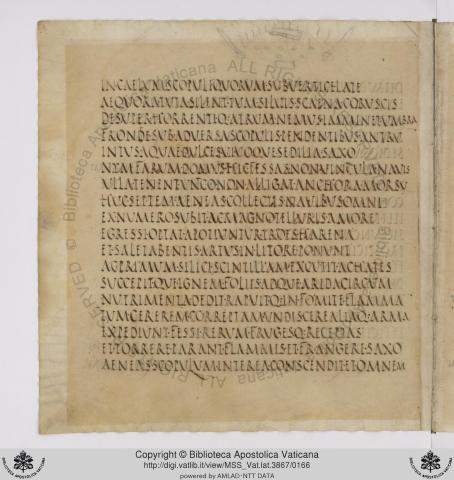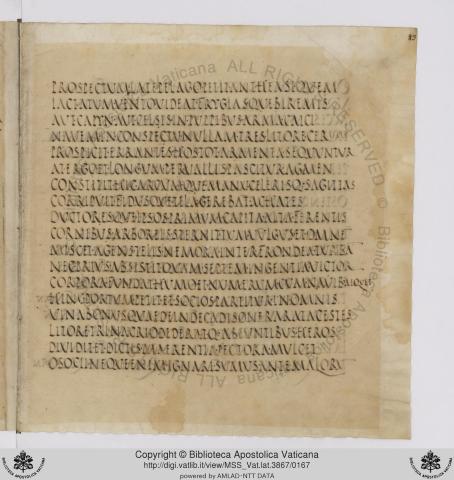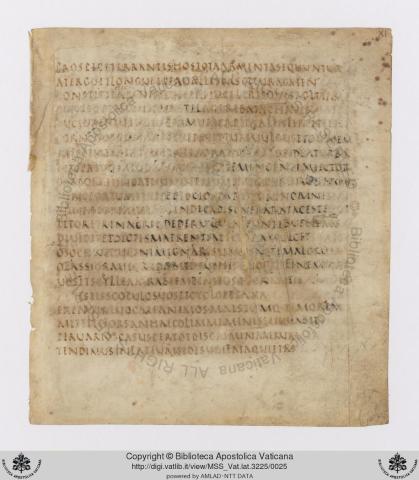Aenēās scopulum intereā cōnscendit, et omnem180
prōspectum lātē pelagō petit, Anthea sī quem
iactātum ventō videat Phrygiāsque birēmēs
aut Capyn aut celsīs in puppibus arma Caīcī.
Nāvem in cōnspectū nūllam, trēs lītore cervōs
prōspicit errantēs; hōs tōta armenta sequuntur185
ā tergō et longum per vallēs pāscitur agmen.
Cōnstitit hīc arcumque manū celerēsque sagittās
corripuit fīdus quae tēla gerēbat Achātēs,
ductōrēsque ipsōs prīmum capita alta ferentēs
cornibus arboreīs sternit, tum vulgus et omnem190
miscet agēns tēlīs nemora inter frondea turbam;
nec prius absistit quam septem ingentia victor
corpora fundat humī et numerum cum nāvibus aequet;
Hinc portum petit et sociōs partītur in omnēs.
Vīna bonus quae deinde cadīs onerārat Acestēs195
lītore Trīnacriō dederatque abeuntibus hērōs
dīvidit, et dictīs maerentia pectora mulcet:
notes
Manuscripts: M | R 180, 181-197 | F
Aeneas explores the coast, slays some deer, and distributes them with wine among the crews (Jerram).
180: interea: while the rest are concerned about commonplace matters, the hero is busy with weightier ones (F-B). omnem: usually explained as a transference (hypallage) of the adjective from its proper noun (pelago) to another—“a view all over the sea”; but, though such transference makes the sense easier and more prosaic, Vergil could not have written omnem prospectum unless the adjective could properly apply to the noun. Aeneas was on the shore with a partial view, but climbing the rock he knew he would get “all the view,” i.e., the full view he wished (Page).
181–182: si...videat: a conditional clause, to be taken as virtual oblique narration.The clause resembles an indirect question, “(to see) if he may,” etc., but genuine indirect questions with si (unlike “if” in English and εἰ in Greek) are comparatively rare, and almost confined to colloquial style (F-B) (AG 576a).
181: prospectum: qualified by the adverb lātē (Page). pelago: Abl. of place, following prospectum petit (Robertson) (AG 429.4). Dative for in pelagus (Frieze). Anthea: Gk. acc., in apposition with quem (Robertson) (summary of Greek proper names as declined in Latin). si quem: in agreement with Anthea (Frieze). Lit. “any Antheus” (Walpole). = si qua (Storr). = sicubi (Conington).
182: Phrygias: i.e., Trojan (F-B). Troy being comprehended by Phrygia Minor (Walpole).
183: Capyn: Greek accusative form (Bennett). arma Caici: Caicus would be the chief man on board his ship, and so his shield would be suspended at the stern (Sidgwick).
184: navem nullam, tres cervos: note the chiasmus and the asyndeton to point the contrast (F-B) (AG 598f).
185: armenta: the plural is designed merely to indicate a large number (Frieze).
187: hīc: the adverb, with temporal force (F-B).
188: fidus quae tela gerebat Achates: introduced, as savoring of heroic times. Thus as Hercules had his faithful armor-bearer Hylas and Achilles his Patroclus, so Aeneas has his fidus Achates (F-B).
190: cornibus arboreis: “with branching antlers” (Storr). May be taken as an abl. of means with alta, or an abl. of description with capita (Wetherell). The abl. may be attached with equal right to either of the three preceding words.The antlers mark the age and majesty of the stags (Conway). vulgus: object of sternit (F-B).
191: miscet agens: the participle marks the persistence and vigour of the action, here by repeated shots, and seems to have something of the color of the imperative age (Conway). turbam: no longer an agmen (186), but a disordered host (F-B).
192–3: nec prius...aequet: “nor does he desist until as victor he stretches seven huge carcasses,” etc. (Bennett). victor: continues the imagery of a battle (Conington).
193: fundat et aequet: the subjunctive implies that he does not intend to cease from the chase before he has killed the seven (Frieze). The subjunctive is used because Aeneas aims at or designs this result (F-B). humi: locative (F-B) (AG 427.3a). “On the ground” (Walpole).
194: hinc: “after this” (F-B). Refers to time = postea (Walpole). “Thereupon” (Frieze). in: = inter, “among” (F-B).
195: the order of the construction is: deinde dividit vina, quae bonus heros Acestes onerarat cadis, dederatque abeuntibus (Robertson). deinde: “next,” with dividit (197) (F-B). Dissyllable by synizesis (Bennett) (AG 603 note). cadis onerarat: “had stowed in jars.” cadis is an ablative of place (F-B). Dative for the prosaic construction, quibus cados onerarat (Frieze). onerarat: = oneraverat, a case of contraction or “syncope” (Carter). Acestes: the son of a Trojan woman named Segesta, dwelt in the western part of Sicily, and had hospitably entertained Aeneas and his followers there during the winter just passed (Frieze) (Smith’s Dictionary, s.v. Acestes).
196: litore Trinacrio: i.e., Sicily (F-B). Abl. of situation (Frieze). heros: “like a hero.” Note the emphatic position. Vergil is anxious to reproduce the tone of the heroic age. Homer’s heroes often give presents to their guests (F-B). Emphatically placed in apposition to Acestes (Walpole).
vocabulary
Aenēās, ae, m.: 1. A Trojan chief, son of Venus and Anchises, and hero of the Aeneid, 1.92. 2. Aenēās Silvius, one of the Alban kings, 6.769.
scopulus, ī, m.: a projecting ledge of rock; a high cliff or rock, 1.180; crag, 1.45; ledge, reef, 1.145; detached rock, fragment of rock, 12.531.
intereā: (adv.), amid these things; meanwhile, in the meantime, 1.418, et al.
cōnscendō, scendī, scēnsus, 3, a. and n.: to ascend, climb, 1.180; mount, 12.736; embark on, 1.381. (com- and scandō, climb)
prōspectus, ūs, m.: a looking forth, view, 9.168; sight, prospect, view, w. dat. of the object, 1.181. (prōspiciō)
lātē: (adv.), widely; far and wide, 1.21; on all sides, far around, 1.163; all over, 12.308. (lātus)
pelagus, ī, n.: the sea; open sea, main, 1.138; flood, 1.246.
Antheus (dissyl.), eos or eī, m.: Antheus, a companion of Aeneas, 1.181.
quis, qua or quae, quid or quod: (indef. pron., adj., and subst.), any, some, 2.94, et al.; some one, any one, any body, anything, something, 1.413, et al.; sī quis, nē quis, etc., if any, lest any, etc., freq.; (adv.), quid, as to anything, in anything, at all, freq.; sī quid, if at all, freq.
iactō, āvī, ātus, 1, freq. a.: to throw often or much; toss to and fro; toss, freq.; hurl, cast, 2.459; thrust out, 5.376; aim, 5.433; (fig.), throw out words, utter, say, 1.102; of the mind, revolve, meditate, 1.227; sē iactāre, boast, exalt one's self, rejoice, glory, 1.140; prae sē iactāre, to make pretense of, 9.134; p., iactāns, antis, arrogant, assuming, ambitious, 6.815. (iaciō)
Phrygius, a, um: Phrygian, Trojan, 1.381; subst., Phrygiae, ārum, f., Phrygian or Trojan women, 518. (Phryx)
birēmis, is, f.: a boat with two oars, or ship with two banks of oars; a galley or ship, 1.182. (bis and rēmus)
Capys, yos or yis, m.: 1. The commander of one of the ships of Aeneas, 1.183. 2. The eighth king of Alba, 6.768.
celsus, a, um: adj. (cellō, rise), high, lofty, 1.56, et al.
puppis, is, f.: the hinder part of a ship; the stern, 5.12; (by synecdoche), a vessel, boat, ship, 1.69; (meton.), crew, 8.497.
Caīcus, ī, m.: Caicus, commander of one of the ships of Aeneas, 1.183.
cōnspectus, ūs, m.: a seeing or viewing; view, sight, 1.34; presence, 6.108; mediō in cōnspectū, in the midst of the gazing assembly. (cōnspiciō)
cervus, ī, m.: a stag, deer, 1.184, et al.
prōspiciō, spexī, spectus, 3, n. and a.: to look forth, forward; to see afar, in the distance, descry, see, 3.648; to look forth or out upon, w. dat., 1.127. (prō and speciō, look)
armentum, ī, n.: collective (arō), beasts used for plowing; cattle, 2.499, et al.; of all kinds of animals, a herd, drove; of deer, 1.185; of horses, 3.540.
vallēs, is, f.: a valley, dell, dale, ravine, vale, 1.186, et al.
pāscō, pāvī, pāstus, 3, a. and n.: to furnish with food; to feed; rear, breed, 6.655; nourish, 1.608; (fig.), 1.464; let grow, 7.391; cherish, indulge, nourish, 10.627; pass. as dep., pāscor, pāstus sum, 3, a. and n., to graze, 1.186; feed upon, eat, 2.471; use for pasture, to pasture, 11.319.
arcus, ūs, m.: a bow, 5.500, et al.; the rainbow, 5.88.
manus, ūs, f.: the hand, 1.487; freq.; (meton.), action, movement of the hand; work, art, handiwork, 3.486; prowess, heroic deed, action, 2.434; force, violence, 2.645; a collection of persons; a band, crew, troop; an army, 2.29; forces, 5.623; multitude, 6.660; pl., manūs, workmen, 11.329; dare manūs, to yield, 11.558; extrēma manus, the finishing hand or touch, 7.572.
sagitta, ae, f.: an arrow, 1.187, et al.
corripiō, ripuī, reptus, 3, a.: to take completely or eagerly; to grasp, snatch, seize, catch, 1.45; hurry away, 1.100; tear away; hasten on, take, 1.418; raise quickly, rouse, 4.572; sē corripere, to hasten away, 6.472. (com- and rapiō)
fīdus, a, um: adj. (fīdō), trustworthy, faithful, trusty, 1.188; safe, secure, hospitable, 5.24; w. gen., tuī fīdissima, most faithful to thee, 12.659.
Achātēs, ae, m.: Achates, a companion of Aeneas, 1.174, et al.
ductor, ōris, m.: a leader, 1.189; captain, commander, 5.133; prince, king, 9.691. (dūcō)
arboreus, a, um: adj. (arbor), pertaining to a tree or trees; tree-like, massive, 12.888; branching, 1.190.
sternō, strāvī, strātus, 3, a.: to spread out, spread, 1.700; stretch on the ground, strike down, slay, 1.190; cast down, prostrate, devastate, 2.306; make level, smooth, calm, 5.763; spread, cover, 8.719; strew, litter; overthrow, conquer, 6.858; pass. (in middle sense), sternor, ī, to stretch one's self, lie down, 3.509.
frondeus, a, um: formed of leaves; covered with leaves; leafy. (frōns)
nec or neque: (adv. and conj.), and not; neither, nor, 1.643, et al.; in prohibition, 3.394, et al.; neque (nec) — neque (nec), neither — nor, 5.21, et al.; nec — et, or -que, may be rendered neither — nor, 12.801; 2.534; nec nōn, and also, nor less, 6.183; nec nōn et, and also, 1.707.
absistō, abstitī, 3, n.: to stand off or away from, followed by the abl., alone or with prep.; withdraw from, 6.259; fly, dart from, 12.102; (with infin.), desist, cease, 6.399; (alone), stop, cease, 1.192.
septem: (num. adj.), seven, freq.
aequō, āvī, ātus, 1, a. and n.: to make equal in size, number, weight, etc., 1.193; 5.419; to equalize, divide equally, 1.508; make equal in length, 9.338; in height, raise to, 4.89; to equal, be equal to; to be as high as, on a level with; keep pace with, 6.263; return equally, requite, 6.474; lift, exalt, 11.125; p., aequātus, a, um, made equal or even; steady, 4.587. (aequus)
portus, ūs, m.: a port, harbor, haven, 1.159, et al; (fig.), 7.598.
partior, ītus sum, 4, dep. a.: to share, divide, distribute, 1.194; separate, 5.562. (pars)
cadus, ī, m.: a jar; wine-jar, 1.195; an urn, 6.228.
onerō, āvī, ātus, 1, a.: to load; the thing or material with which, usually in abl. and rarely in acc., 1.706; stow, lade, store away, w. dat. of the thing receiving, 1.195; (fig.), burden, overwhelm, 4.549. (onus)
Acestēs, ae, m.: Acestes or Segestus, the son of Crimisus, a Sicilian river god, and Egesta or Segesta, a Trojan woman, 1.195.
Trīnacrius, a, um: adj. (Trīnacria), Sicilian, 3.384.
abeō, īvī, or iī, itus, īre, irreg. n.: to go away, depart, 2.675; go off, go aside, turn off, 5.162; pass into, sink into, 9.700; go forward, take the lead, 5.318; retreat, 2.382; change or be transformed.
hērōs, ōis, m.: a demigod; a hero, 6.192, et al.; an illustrious man, champion, hero, 5.453.
dictum, ī, n.: a thing said; word, 1.197; command, precept, injunction, 1.695; promise, 8.643. (dīcō)
maereō, 2, n. and a.: to be sorrowful, sad; mourn, grieve, 1.197, et al. (cf. miser)
mulceō, mulsī, mulsus or mulctus, 2, a.: to stroke; lick, 8.634; (fig.), soothe, caress, comfort, 1.197; mitigate, soften, calm, 1.66; to make harmonious, charm, 7.34.



